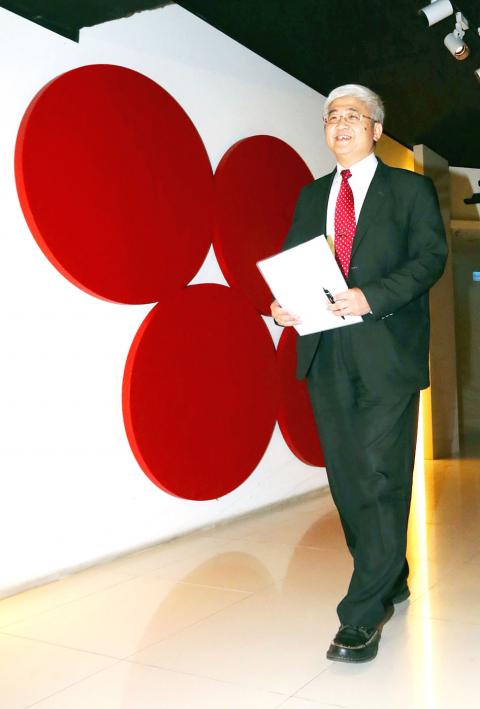Wei Chuan Foods Corp’s (味全食品工業) new chairman yesterday vowed to take bold measures to win back the public’s trust over the safety of its food.
“I hope to lead Wei Chuan back on the right track, with four major directions: raising business ethics, launching a complete food traceability system, improving information disclosure, and corporate social responsibility [CSR],” new Wei Chuan chairman Jason Lee (李鳳翱) told a press conference at the company’s headquarters in Taipei.
Lee, 51, served as chairman of the Consumers’ Foundation in 2005 and 2006.

Photo: CNA
Wei Chuan’s board yesterday approved Lee’s appointment to replace Wei Ying-chun (魏應充), who stepped down last month after the company, its parent company — Ting Hsin International Group (頂新國際集團) — and its affiliated companies were all found to be selling cooking oils made with ingredients unfit for human consumption.
In September, Wei Chuan was forced to recall several of its oil products after they were found to contain recycled cooking oil and oil extracted from industrial grease.
Meanwhile, Cheng I Food Co (正義股份) had been selling 68 lard-based edible oils containing oil meant for use in animal feed and Wei Chuan had used some of those oils in products sold under its own brand.
The discovery sparked outrage, leading consumers to stage a boycott of Ting Hsin and Wei Chuan products.
While expecting Lee to lead the company’s reform in food traceability management and information disclosure, Wei Chuan’s board also elected four new members, after the Wei (魏) family agreed to completely give up their management rights in the firm, a move that is in line with the company’s previous announcement and market expectations.
Shih Hsin University vice principal Chen Ching-ho (陳清河), Taipei Medical University pharmacy professor Cheng Hui-wen (鄭慧文) and National Open University public administration associate professor Johnson Shen (沈中元) took over three board seats vacated by Wei Ying-chiao (魏應交), the second son of the Wei family, Wei Hung-ming (魏宏名), son of Wei Ying-chou (魏應州), the eldest of the four Wei brothers, and Taiwan FamilyMart Co (全家便利商店) chairman Pan Chin-ting (潘進丁), who represented the Wei family and stepped down last month.
Wei Chuan’s board also elected accountant Charles Chen (陳永清) as one of the two supervisors in the 11-member board, which has nine directors.
Chen replaced Frank Lin (林清棠), vice president of Tingyi (Cayman Islands) Holding Corp (康師傅控股), which is best known for its Master Kong brand and is also owned by the Wei family.
The Wei family still holds a 40.4 percent stake in Wei Chuan.
However, Lee said the Wei family has promised him complete run of the firm’s management, with no interference or resistance to the new Wei Chuan board’s operations.
“I will never be a rubber stamp or puppet” of the Wei family, Lee said.
Wei Chuan’s stock surged by the daily limit of 7 percent yesterday to close at NT$28.2 on the Taiwan Stock Exchange.
Additional reporting by CNA

Intelligence agents have recorded 510,000 instances of “controversial information” being spread online by the Chinese Communist Party (CCP) so far this year, the National Security Bureau (NSB) said in a report yesterday, as it warned of artificial intelligence (AI) being employed to generate destabilizing misinformation. The bureau submitted a written report to the Legislative Yuan in preparation for National Security Bureau Director-General Tsai Ming-yen’s (蔡明彥) appearance before the Foreign Affairs and National Defense Committee today. The CCP has been using cognitive warfare to divide Taiwanese society by commenting on controversial issues such as Taiwan Semiconductor Manufacturing Co’s (TSMC, 台積電) investments in the

INVESTIGATION: The case is the latest instance of a DPP figure being implicated in an espionage network accused of allegedly leaking information to Chinese intelligence Democratic Progressive Party (DPP) member Ho Jen-chieh (何仁傑) was detained and held incommunicado yesterday on suspicion of spying for China during his tenure as assistant to then-minister of foreign affairs Joseph Wu (吳釗燮). The Taipei District Prosecutors’ Office said Ho was implicated during its investigation into alleged spying activities by former Presidential Office consultant Wu Shang-yu (吳尚雨). Prosecutors said there is reason to believe Ho breached the National Security Act (國家安全法) by leaking classified Ministry of Foreign Affairs information to Chinese intelligence. Following interrogation, prosecutors petitioned the Taipei District Court to detain Ho, citing concerns over potential collusion or tampering of evidence. The

‘COMPREHENSIVE PLAN’: Lin Chia-lung said that the government was ready to talk about a variety of issues, including investment in and purchases from the US The National Stabilization Fund (NSF) yesterday announced that it would step in to staunch stock market losses for the ninth time in the nation’s history. An NSF board meeting, originally scheduled for Monday next week, was moved to yesterday after stocks plummeted in the wake of US President Donald Trump’s announcement of 32 percent tariffs on Taiwan on Wednesday last week. Board members voted to support the stock market with the NT$500 billion (US$15.15 billion) fund, with injections of funds to begin as soon as today. The NSF in 2000 injected NT$120 billion to stabilize stocks, the most ever. The lowest amount it

NEGOTIATIONS: Taiwan has good relations with Washington and the outlook for the negotiations looks promising, Minister of Economic Affairs J.W. Kuo said Taiwan’s GDP growth this year is expected to decrease by 0.43 to 1.61 percentage points due to the effects of US tariffs, National Development Council (NDC) Minister Paul Liu (劉鏡清) said at a meeting of the legislature’s Economics Committee in Taipei yesterday, citing a preliminary estimate by a private research institution. Taiwan’s economy would be significantly affected by the 32 percent “reciprocal” tariffs slapped by the US, which took effect yesterday, Liu said, adding that GDP growth could fall below 3 percent and potentially even dip below 2 percent to 1.53 percent this year. The council has commissioned another institution